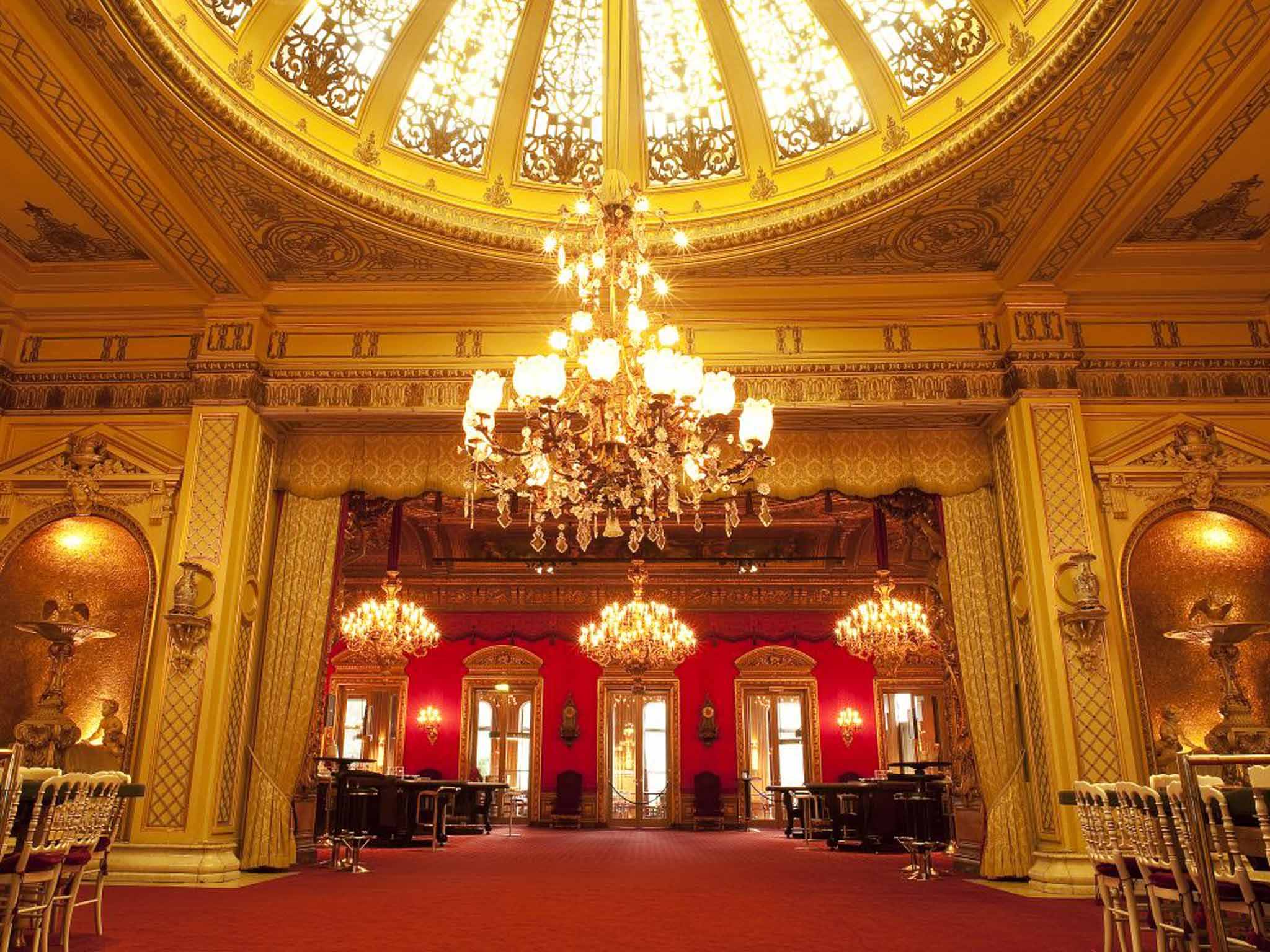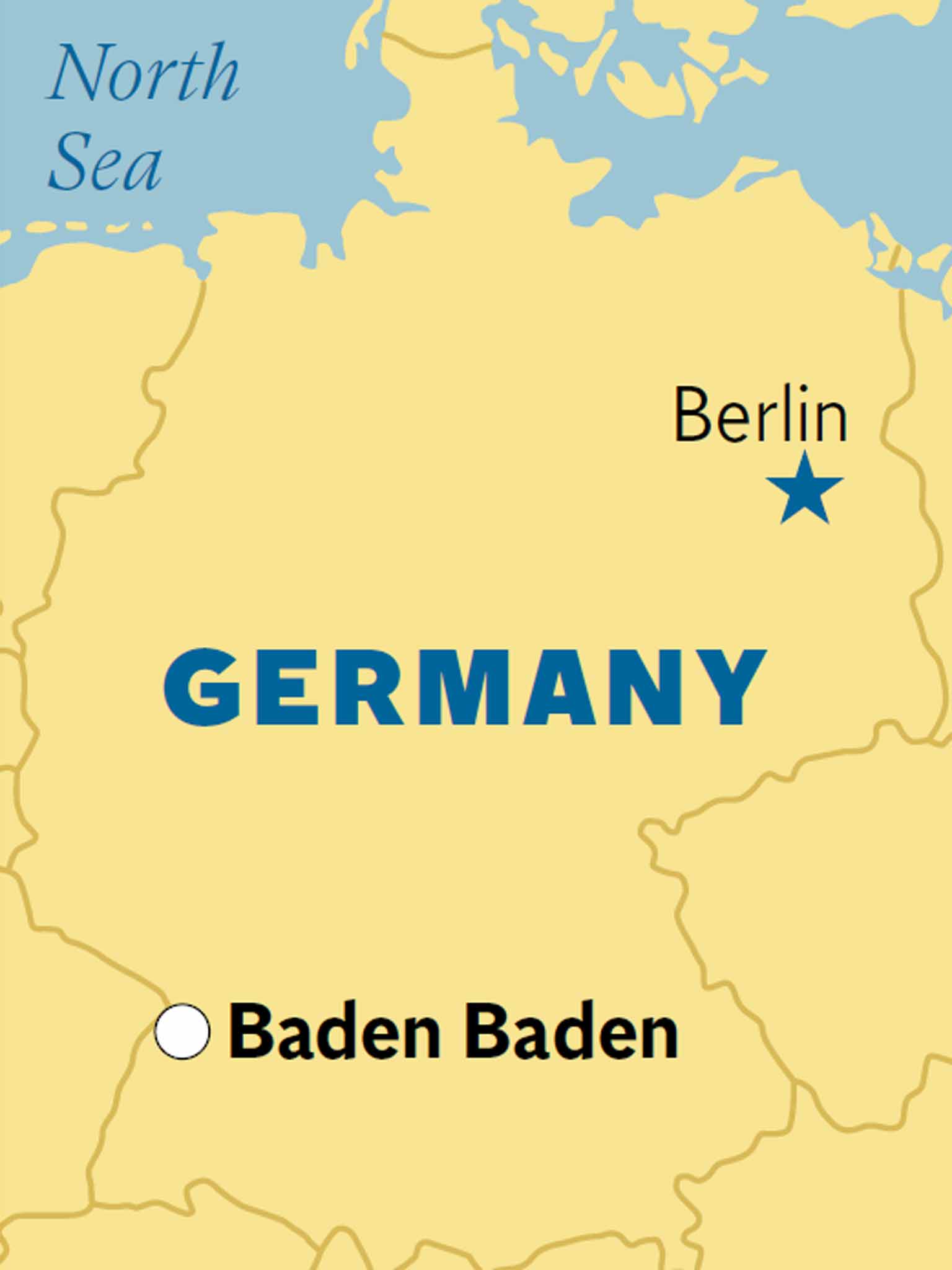Baden-Baden's casino: Taking a gamble
A gilded casino is the main draw in the German spa town, writes William Cook

Marlene Dietrich called it the world's most beautiful casino, and though its glory days are long gone, Baden-Baden's ornate Kurhaus, designed 190 years ago, still oozes style and grace. "Nicht gehts mehr," calls the croupier (no more bets), as he whirls the little white ball around the roulette wheel, and the punters gathered at the green baize fall silent, praying for lucky numbers.
Since the 18th century, when gambling came to Baden-Baden, this sedate spa town has been a guilty pleasure, a brief respite from the workaday rat race. Ostensibly prim and proper, like a Teutonic Cheltenham, for several centuries this Black Forest resort has had a louche cachet quite out of keeping with its respectable demeanour. Even today, with its decadent heyday long behind it, it's still the ideal location for a hedonistic weekend away.
Hidden in a wooded valley on the edge of the Black Forest, Baden-Baden was founded by the Romans as a health farm, somewhere for soldiers and citizens to unwind. They built a bathhouse here – you can still see the foundations – and although these fine buildings fell into ruins, the hot springs that fed them are still bubbling away. By the 19th century these mineral baths, rich in calcium and magnesium, had become a fashionable cure-all. And what better way to round off a treatment than with a game of chance?
Gambling was first recorded here in 1748, but Baden-Baden's golden age began when Paris closed its casinos in 1838. In the same year two Frenchmen, brothers Jacques and Edouard Benazet, opened a grand casino in the neo-classical Kurhaus, festooned with chandeliers and gold leaf, and gamblers flocked here from all over Europe to feed their habit.

Russians came too, including Fyodor Dostoyevsky, who was subsequently inspired to writeThe Gambler. "Why is gambling worse than any other method of acquiring money?" he asks defiantly in the taut novella. Turgenev came too, and wrote a novel of his own, Smoke, but it's The Gambler that really captures Baden-Baden's subdued, almost sombre ambience. "I am lonely and alone," wrote Dostoyevsky. "I sit brooding in this melancholy little town – and how melancholy the little towns of Germany can be."
Today a new wave of Russians has come flooding into Baden-Baden, the nouveau riche of the 21st century. They're even buying houses here. Dostoyevsky's old house, beside the Roman baths, is now an estate agent's office with Cyrillic adverts in the window. They come to the casino too, of course ("Roulette was devised especially for Russians," quipped Dostoyevsky) and though it's not as grand as it used to be, a lost evening in the Kurhaus still elicits an unholy, illicit frisson.
To come inside you need to show your passport and pay a €5 entrance fee. Men must wear a jacket and a shirt and tie while women are asked to wear "appropriate attire" – whatever that means. Some wear ball gowns. Some wear jeans. The minimum bet is €2, but you're free just to watch if you want to. Nobody pays you any attention. All eyes are on the tables. "Nicht gehts mehr" calls the croupier again, a funereal figure in a crumpled dinner jacket, as punters scatter chips across the baize. The roulette wheel spins from 2pm to 2am. There are no clocks. Time stands still. "At such moments one forgets both oneself and one's former failures," wrote Dostoyevsky. "I had dared to risk and behold, again I was a member of mankind."
Back outside, after the thrill of risking more than you can afford to lose, Baden-Baden's other pleasures are more tranquil. You can drink the warm spring waters in the Trinkhalle, or bathe in them in the Friedrichsbad, a palatial bathhouse built in the 19th century on the site of the Roman baths. The Friedrichsbad is a nudist bath – although men and women bathe together, swimming costumes are verboten – but the atmosphere is strangely anodyne. Bare flesh has never seemed more natural, or unappealing. If you'd prefer to cover up, the modern Caracalla baths – named after Emperor Marcus Aurelius Caracalla, who founded the town – are next door.
Baden-Baden's landmark hotel, one of the best known in Germany, is Brenners, a short walk across the park from the casino. Fittingly, the most famous name on its lengthy guest list is Edward VII, renowned for his love of gambling. During the last century it has accommodated countless heads of state – Adenauer and De Gaulle forged the Franco-German entente here 52 years ago – but for gamblers as well as statesmen, it's still the smartest place to stay. There's a Reynolds above the drawing room fireplace, but the best picture is the park outside, and the Kurhaus in the distance. Lunch is over, it's just turned two o'clock, and the roulette wheel is about to spin again.
Travel essentials
Getting there
Karlsruhe-Baden Baden airport is served daily by Ryanair (0871 246 0000; ryanair.com) from Stansted.
Staying there
Brenners, Schillerstrasse 4/6 (00 49 7221 9000; brenners.com). Doubles from €320, excluding breakfast.
Visiting there
Kurhaus (00 49 7221 353 207; kurhauscasino.de).
Trinkhall (00 49 7221 275 200; Kaiserallee 3).
Friedrichsbad (00 49 7221 275 920; friedrichsbad.eu; entry from €23).
Caracalla baths (00 49 7221 275 940; bit.ly/Caracalla-Baths; entry from €15).
More information
Join our commenting forum
Join thought-provoking conversations, follow other Independent readers and see their replies
Comments
Bookmark popover
Removed from bookmarks